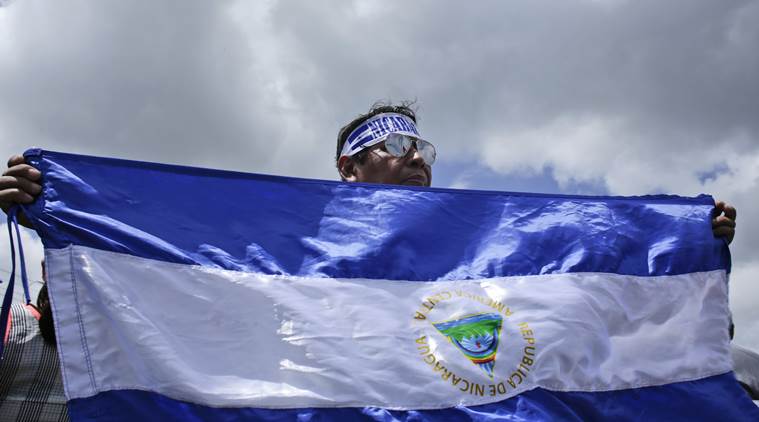US warns Nicaragua is following path of Syria and Venezuela
A report released last Wednesday by the Office of the U.N. High Commissioner for Human Rights on four months of unrest in the country described government repression that stretched from the streets to courtrooms, where some protesters face terrorism charges.

A man holds a Nicaraguan national flag during a demonstration supporting journalists recently attacked while covering protests demanding the resignation of President Daniel Ortega and the release of all political prisoners, in Managua, Nicaragua. (AP Photo/Arnulfo Franco)
The United States warned the Security Council on Wednesday that Nicaragua is heading down the path that led to conflict in Syria and a crisis in Venezuela that has spilled into the region but Russia, China and Bolivia said Nicaragua doesn’t pose an international threat and the U.N. should butt out.
The sharp exchanges took place at the first Security Council meeting called by U.S. Ambassador Nikki Haley, the current council president, to address what the U.N. says is the government’s violent repression of student and opposition protests that have killed over 300 people since mid-April and led thousands to flee the country. “With each passing day, Nicaragua travels further down a familiar path. It is a path that Syria has taken. It is a path that Venezuela has taken,” Haley said.
1m 15s

Anti-government protests continue to shake up Nicaragua
Student-led protests against President Daniel Ortega that began in April continue in the Nicaraguan capital Managua.
She said Nicaragua’s President Daniel Ortega and Venezuela’s President Nicolas Maduro “are cut from the same corrupt cloth … And they are both dictators who live in fear of their own people.” But she said there is still an opportunity for Nicaragua’s government “to prevent tyranny from threatening peace and security” by responding to the people’s demands for freedom, an end to “dictatorship,” and the release of arbitrarily jailed protesters.
Russia’s U.N. Ambassador Vassily Nebenzia countered that the “subversive policies of the United States against Nicaragua have a long history” and the meeting _which Moscow “categorically objects to” represented “a glaring and grim example of destructive foreign intervention.” He warned that “following today’s discussion, polarization in Nicaragua will only worsen.”
In Nicaragua, Ortega responded to Haley’s comments in a speech to a pro-government march in Managua. “What should we say to the United States?” the Nicaraguan president said. “We’ll tell them that if they want to help the Nicaraguan people, if they want to contribute to peace, the best thing they can do and should do is not meddle in Nicaragua, respect Nicaragua.”
The popular protests that began in mid-April were triggered by cuts to the social security system. Ortega reversed the cuts, but demonstrations quickly expanded and turned into a call for him to step down. He has refused to give up power before elections scheduled for 2021.
A report released last Wednesday by the Office of the U.N. High Commissioner for Human Rights on four months of unrest in the country described government repression that stretched from the streets to courtrooms, where some protesters face terrorism charges.
The human rights office called on the government to immediately halt the persecution of protesters and disarm the masked civilians who have been responsible for many of the killings and arbitrary detentions. It also documented cases of torture and excessive force.
Two days later, the government expelled the U.N. human rights team in the country. Gonzalo Koncke, chief of staff to the secretary-general of the Organization of American States, told the council that Nicaragua “is at a critical juncture and the government must take critical measures” to re-establish democracy in the country.
The government must quickly hold “free, just, democratic and transparent elections” and start a dialogue with all parties that leads to agreements. If democracy is not restored, Koncke warned, Nicaragua “may go the way of other countries in the region who have fallen in the arms of dictators.”
Civil society leader Felix Maradiaga, a former secretary general of Nicaragua’s Ministry of Defense who said he faces constant death threats, told the council he came to convey the urgency of the situation in the country that threatens peace and security in the region. “Every day we see a climate of terror and indiscriminate persecution,” he said, citing the rising number of political prisoners, armed and masked people bursting into homes, and sexual attacks.
“For more than a decade, the Daniel Ortega regime has been benefiting from the fact that it is off the international agenda, off the international radar,” Maradiaga said. “So we are seeing the danger of Nicaragua spinning out of control in a volatile region of the world.”
Nicaragua needs the attention of the United Nations, he said, “to ensure there is peace and security before it’s too late.” And he urged the U.N.’s most powerful body to adopt a legally binding resolution, assign resources and establish a system to monitor what’s happening in the country and support the restoration of the rule of law.
Nicaragua’s Foreign Minister Denis Moncada Colindres made no mention of the unrest or elections, stressing instead that “in Nicaragua we love peace, we strengthen our security and we promote and defend human rights in a holistic way.”
“There is consensus in this council Nicaragua does not represent a threat to international peace and security,” he said.















.png)



























No hay comentarios:
Publicar un comentario